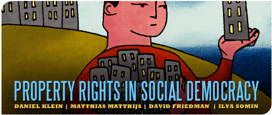I want to thank David Friedman for his comments and would like to write a brief response.
Firstly, nowhere in my original response to Daniel Klein’s essay did I argue that the trend in the United States over the past thirty years has been towards a smaller state. Unfortunately, both Republicans and Democrats find it quasi impossible in a mature democracy as this one to cut spending and public services to their constituents. They seem to have a much easier time cutting taxes. Hence we should not be surprised that we are stuck with record federal deficits and national debt. I am actually surprised by Friedman’s numbers that the federal government shrunk in size from 21.7% to 21%. I also believe that very few modern democracies will be able to make a significant dent in public spending for the simple reason that such governments will be committing instant political suicide.
I think the more important point is not about the size of the state — something which nobody disputes — but about the distribution of income. Since the coming to power of Ronald Reagan in the United States and Margaret Thatcher in the United Kingdom, both countries have become almost as unequal as many developing countries today. The distribution of income as a consequence of their regressive measures of cutting income tax and raising all kinds of indirect taxes — all in the name of supply side stimulus — became much more unequal since 1980. Now, as most economists would argue, inequality is not necessarily a bad thing: it gives market participants the right incentives to work hard and move up the social ladder. No disagreement there. However, if the richest one percent’s share of pretax national income goes from 8% in 1980 to 17% in 2008, and the bottom quintile of the income distribution sees virtually no increase in wages, U.S. society starts to have a problem in that many people will no longer believe in the system. By some measures, there is now higher social upward mobility in France than in the United States. That surely cannot be a positive trend if you are in favor of a more libertarian society, and must make many libertarians nervous.
Secondly, it would be wrong to blame the global financial crisis only on just one factor, namely government intervention in the mortgage market. It’s like blaming community organizers like Barack Obama for the crisis because they tell people that they could aspire to buy their own home one day. Every crisis needs a trigger, and this crisis was indeed triggered by subprime mortgage defaults in the United States starting in the summer of 2007. Both Democrats and Republicans are to blame here, as both parties see “owning your own home” as part of the American Dream. This has of course nothing to do with free market ideology, so libertarians definitely have a point here. When I interviewed Nigel Lawson, Thatcher’s “brilliant chancellor,” in 2006 in London, he told me that subsidized mortgage rates for the lower middle classes were always a major point of contention between him and the prime minister. Thatcher thought it was important to help what she considered ‘her people,’ while Lawson steadfastly held the view that it was distorting the market.
So I agree that Fannie and Freddie had the wrong incentives and issued way too many mortgages to people who could not afford them. Also, there is no doubt in my mind that government mistakes were made by the Federal Reserve (keeping interest rates too low for too long, which fueled the housing bubble) as well as lax regulation and perverse incentives for rating agencies and financial institutions.
The heart of the matter is what made this system possible in the first place. It seems to me that the overarching neoliberal economic framework — of privatization, deregulation and liberalization — should get the major part of the blame. When Raghuram Rajan of the IMF suggested to Larry Summers that the derivatives markets probably should be better regulated, he was dismissed by Summers as a “Luddite,” and when others warned the Fed that it should increase interest rates to slow down the housing and stock market boom, they were told that there was such a thing as the “Great Moderation” and that central banks knew exactly how to run a modern economy based on neoclassical economic principles.
Since 1979, there has been a relentless movement towards less government intervention in the economy — probably all over the world. So, to now blame the biggest economic disaster since the Great Depression on two quasi-governmental firms with perverse incentives in the mortgage market strikes me as too easy an explanation.
On a hopeful note, one issue where I think liberals and libertarians might find more common ground in the United States is on the ‘too big to fail’ problem, and to advocate the reinstatement of some kind of version of the Glass-Steagall Act. Free markets can only function well if there is competition and economic power is not concentrated in just a few firms. The sorry outcome of the financial crisis is that there are now fewer big banks on Wall Street than ever before. They are not only “too big to fail,” but probably also “too big to bail” by now.

